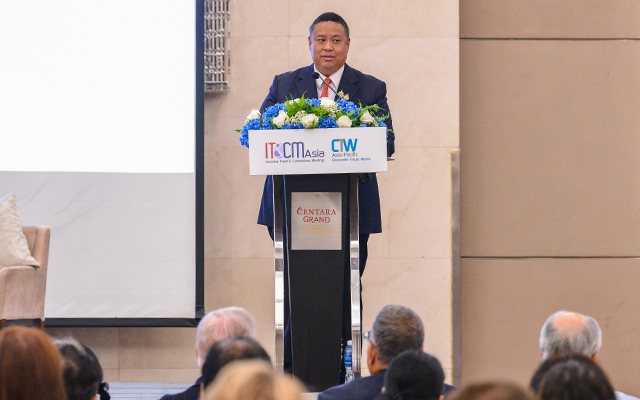
As part of the Thailand Convention and Exhibition Bureau’s (TCEB) MiceNext strategy, festivals are seen as more than just cultural gatherings – they are tools for economic development and community collaboration.
During his opening keynote at IT&CM Asia, Chiruit Isarangkun Na Ayuthaya, president of TCEB, laid out how festivals are emerging as a vital component of the business events industry, pushing the boundaries of traditional events.

“A close watch on the industry reveals we are experiencing new forms of events that go beyond the existing differentiation of conferences, tradeshows, meetings, and incentives – they are a combination of all three,” said Chiruit.
As such, TCEB’s MiceNext strategy aims to create a “festival economy”, positioning festivals as platforms for promoting Thailand’s cultural soft power and supporting regional economies.
He elaborated: “Often, what is important is the support from the government bodies and we realise that. Especially in festival destinations, when we combine the business elements that we have and professional knowledge, they can become a tool in distributing economic welfare of higher value to more (secondary) destinations around the country, rather than having it concentrated in major cities like Bangkok.”
Festivals can also cater to evolving audience preferences, particularly among younger generations.
This is because the younger generation seeks experiences that go beyond traditional business models, prioritising personal growth and knowledge. Festivals, in particular, offer a unique platform to fulfil this aspiration, Chiruit explained.
Additionally, he emphasised that transforming local festivals into key contributors to the global economy “is possible”, citing examples of the evolution of Thailand’s silk industry festivals.
For example, the Khon Kaen Silk Festival has grown from a local event into a thriving international platform featuring business matching between local silk entrepreneurs and buyers from major cities. This achievement has generated significant revenue, and showcased the global cultural significance of silk production.
Next year, TCEB will lead a delegation of Thai silk entrepreneurs to France. They will participate in the Silk In Lyon event, which offers an opportunity to learn about Lyon’s silk production history and explore potential partnerships.
Any exhibition or a business event can also be styled as an experiential festival too, such as the Money 20/20 FinTech event held in Bangkok in April 2024. The event incorporated innovative, non-conventional settings, networking opportunities, and CSR activities.
According to Chiruit, “Money 20/20 gave us at TCEB a whole new perspective”, as it was not a typical corporate meeting, and was a “business festival” that attracted participants from all over the globe.




















